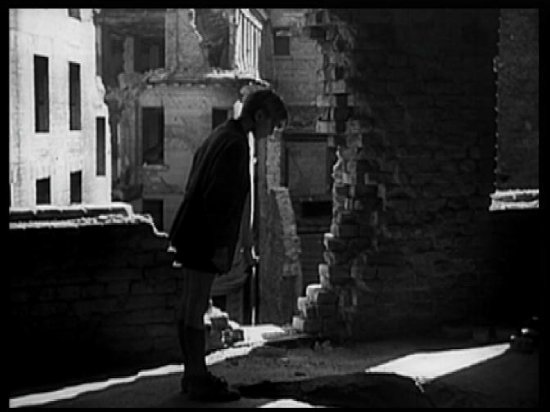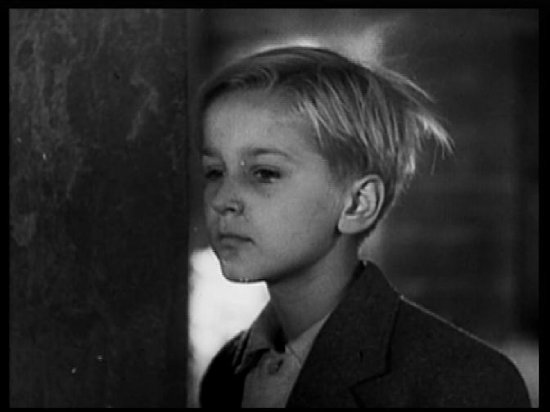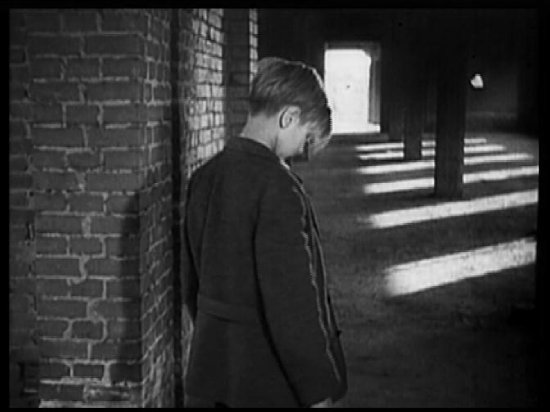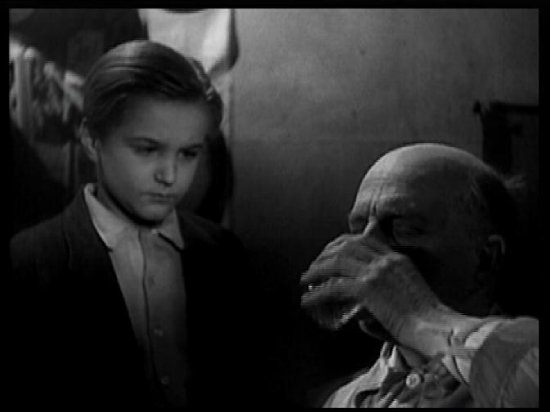Review for Germany, Year Zero
After the death of Adolf Hitler and the breakdown of his Nazi party, the city of Berlin was a crumbling metropolis, eradicated by warfare. The urban-dwellers who survived this disaster had to endure a life of abject-poverty in bombed-out houses. In order to survive this nightmare, Edmund Koeler has to find employment so he can buy food for his dying father and his two older siblings. Being only 12-years-old, Edmund is too young to dig graves for the fallen soldiers and attempts to flog bits and pieces on the black market. Edmund is not successful. It is a time for hope in these dark, desperate days but Edmund's sister refuses to have sex with Allied Troops and his soldier brother is scared of going to prison as a war criminal. Shuffling through the dilapidated streets, Edmund bumps into his old school teacher. He asks this man to rehabilitate his fading father. Mr. Enning, who still adheres to his Nazi morality, tells Edmund, 'you need the courage to sacrifice the weak'. Edmund takes these words literally and finds the cure for his father's illness. Edmund also discovers a solution to end his own struggles in the war-ravaged city of Berlin…

Roberto Rossellini began his war trilogy at the end of the Second World War with Rome, Open City. One year later, he made Paisa. The final film, Germany, Year Zero came in 1948. It is a gut-wrenching and unflinching portrayal of societal disintegration. It is also a sobering depiction of shattered innocence. After the exploits of war, there was no opportunity for humanity to reassert itself. Post-war German poverty resulted in a struggle for survival. Edmund is a youth, twisted and manipulated by monsters that hold onto decaying ideals. Rossellini begins Germany, Year Zero with a sobering voice-over, which makes his intentions clear -' if anyone, after watching Edmund Koeler's story, feels that something needs to be done - that German children need to relearn to love life - then the efforts of those who made this movie will be greatly rewarded'.

This statement of intent comes to fruition in the final sequence. It is an upsetting and pointless act. Edmund is an adolescent who has also turned into his own brutal monster - a tragic puppet-like figurine who only knows the death and destitutions of war. He knows nothing of the magic of life. Germany, Year Zero is an open-minded portrait of a nation destroyed by perverse and unhinged ideologies ('you need the courage to sacrifice the weak'). It is not an indictment of the German people. In Rossellini's own words, 'it is an objective assessment'. This makes for deeply disturbing cinema. Germany, Year Zero contains an emotional core that is ready to explode. Martin Scorsese summed it up best when he called the film a 'prayer from Rossellini to the post-war world, a prayer for compassion'.

Special Features: There was a Region 1 Criterion box set released at the start of 2010 with all three Rossellini war films with a plethora of extras. Sadly, this release is devoid of supplementary material.
Disc: The film is available for the first time ever on UK DVD and you can purchase it via the MovieMail website: www.moviemail-online.co.uk.
Verdict: Rossellini's cinema vérité style filmmaking captures the coarse and asperous realities of life after war and the hardship endured by the German people throughout the rise and fall of Nazism. Imagine living in Germany in the months after the Second World War, would you feel guilt or relief after the dust had cleared? You have to see Germany, Year Zero if you are interested in Italian neo-realism. It is a nightmare-induced and provocative vision by one of the masters of Italian cinema. Who are we to judge if we still hold on to the principles of humanity and compassion. If we hate we lose control…

Your Opinions and Comments
Rossellini found Edmund working as an acrobat in a Berlin circus and chose him for the role especially because he looked very much like Rossellini's young son, who had recently died. When location filming ended, the unit and actors moved to Rome to film the interiors and, after the film was wrapped up there, the actors didn't want to go back to Germany and disappeared into the Italian countryside and cities. It is not known what became of Edmund, who, if still alive, would be 81 years old by now. But what an incredible legacy he left behind him in the shape of his unique performance in this classic film.
I have the recent stand alone DVD release of it, restored by the BFI and containing the original German dialogue soundtrack and I highly recommend the BFI version over the others, which, I understand, have a redubbed Italian dialogue soundtrack.